6 Vegetables We Should Never Store Together: Maximizing Freshness and Nutrition
As an advocate for natural, clean eating and the philosophy of “Let food be thy medicine,” I’ve come to appreciate the profound impact that proper food storage can have on our health and well-being. In India, where our culinary traditions are deeply rooted in fresh, wholesome ingredients, understanding how to store our vegetables correctly is not just a matter of convenience—it’s a crucial step in preserving their nutritional value and flavor.
The ancient wisdom of Ayurveda teaches us that food is our primary source of prana or life force. By storing our vegetables correctly, we’re not just extending their shelf life; we’re safeguarding their vital energies and ensuring that we receive maximum nourishment from every bite. Let’s explore six common vegetables that should never be stored together and learn how to keep our produce at its peak freshness.
The Science Behind Vegetable Storage
Before we delve into specific vegetable combinations, it’s important to understand the science behind proper storage. Many fruits and vegetables produce ethylene gas as they ripen. This natural plant hormone can accelerate the ripening process in other produce, sometimes leading to premature spoilage.
Key Facts:
- Ethylene is a colorless, odorless gas produced by certain fruits and vegetables.
- It can cause nearby produce to ripen faster, which may lead to overripening or spoilage.
- Some vegetables are more sensitive to ethylene than others
- Proper storage can significantly extend the life of your produce
Now, let’s examine six vegetable combinations that should be kept apart to maintain freshness and nutritional value.
1. Potatoes and Onions: A Separation of Flavors
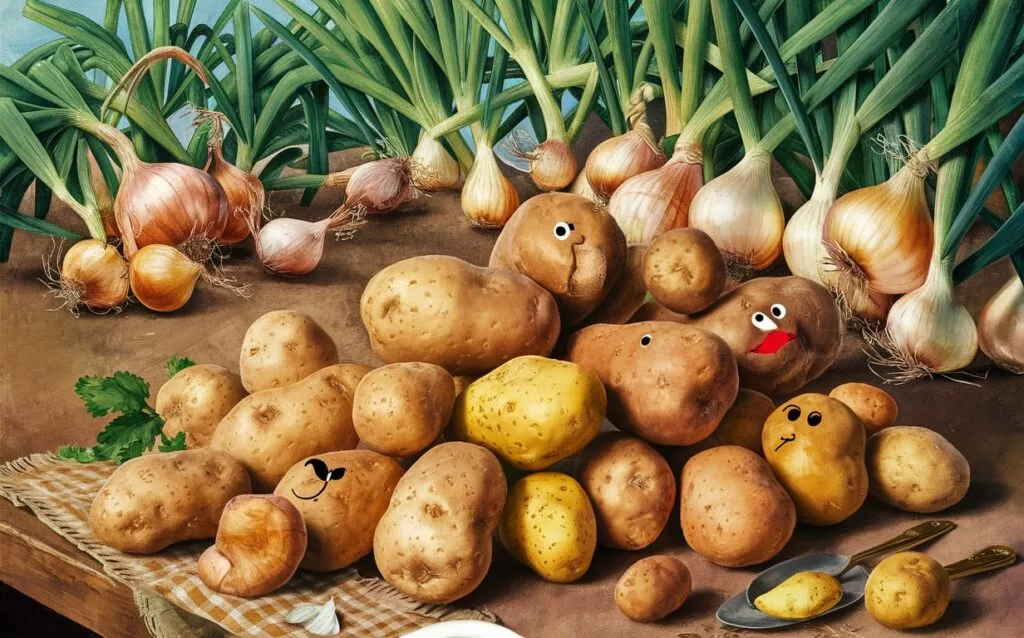
In many Indian kitchens, it’s common to see potatoes and onions stored together in a basket. However, this practice can lead to faster spoilage for both vegetables.
Why They Shouldn’t Mix:
- Onions emit ethylene gas, which can cause potatoes to sprout and soften prematurely
- The moisture from potatoes can cause onions to rot more quickly
- Flavors can transfer between the two, affecting their taste
Storage Solution:
Store potatoes in a cool, dark place with good air circulation. Keep onions in a separate, well-ventilated area. Both should be kept away from direct sunlight.
2. Tomatoes and Cucumbers: Temperature Incompatibility
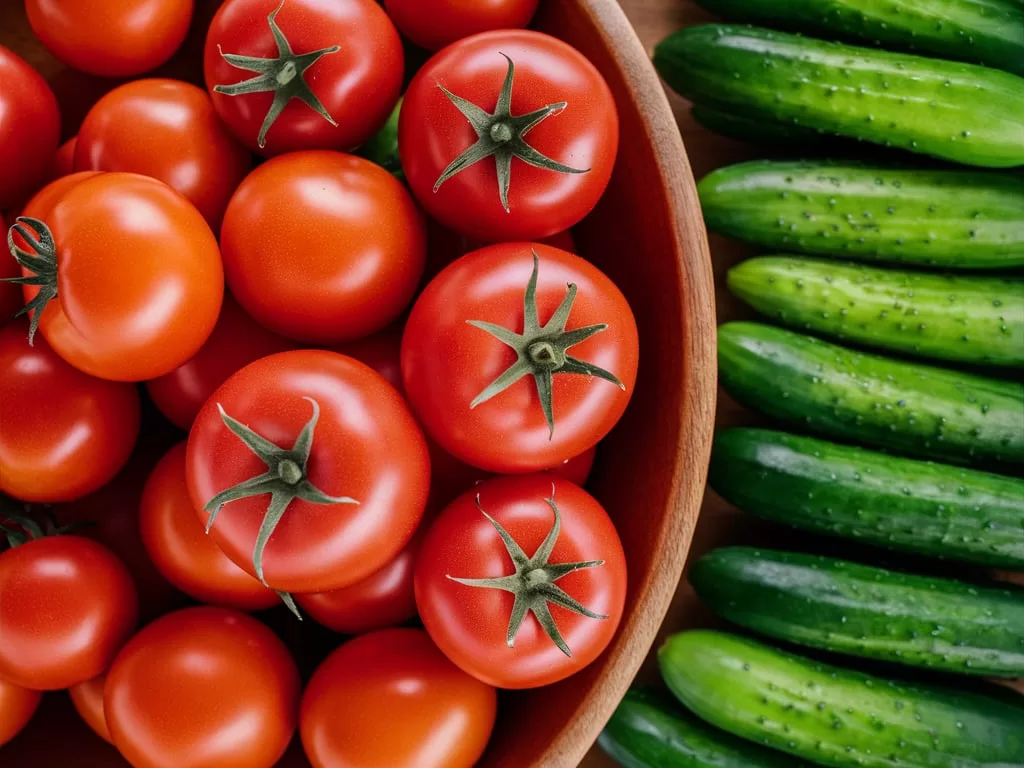
Tomatoes and cucumbers are staples in Indian salads and raitas. However, their storage needs are quite different.
Why They Shouldn’t Mix:
- Tomatoes prefer room temperature, while cucumbers need refrigeration
- Storing tomatoes in the fridge can make them mealy and less flavorful
- Cucumbers are sensitive to ethylene produced by tomatoes
Storage Solution:
Keep tomatoes on the counter, away from direct sunlight. Store cucumbers in the refrigerator, wrapped in a clean, dry cloth to absorb excess moisture.
3. Apples and Leafy Greens: The Ethylene Effect
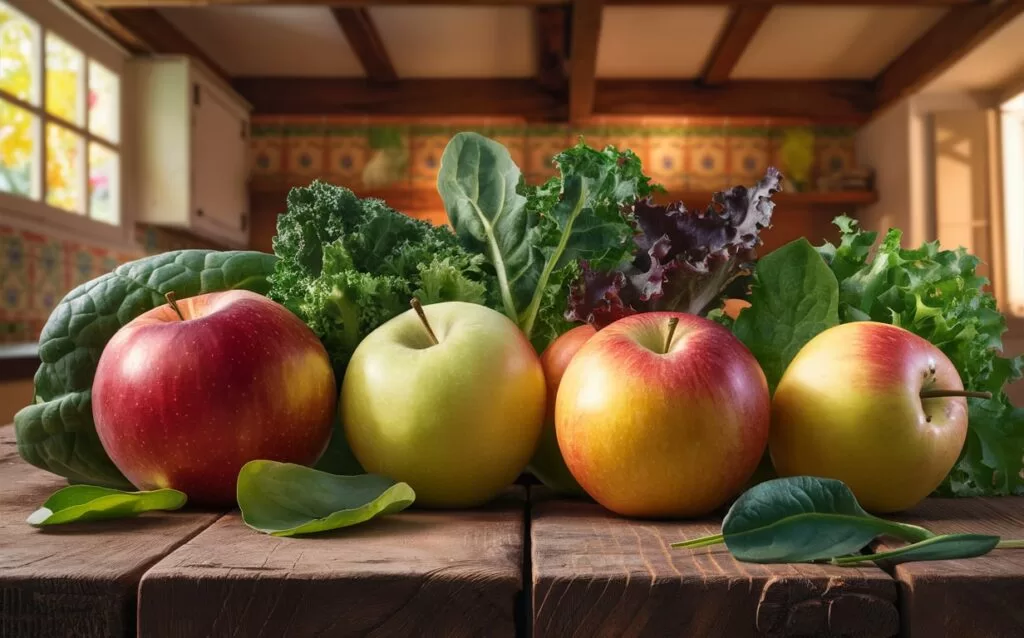
While not strictly a vegetable, apples are often stored alongside produce, however, they should be kept away from leafy greens like spinach and methi (fenugreek leaves).
Why They Shouldn’t Mix:
- Apples are high ethylene producers
- Leafy greens are extremely sensitive to ethylene and will wilt faster when exposed
- The ethylene from apples can cause greens to turn yellow and spoil quickly
Storage Solution:
Store apples in the refrigerator and separate them from other produce. Keep leafy greens in the crisper drawer, wrapped in a slightly damp cloth to maintain humidity.
4. Carrots and Beets: Root Vegetable Rivalry
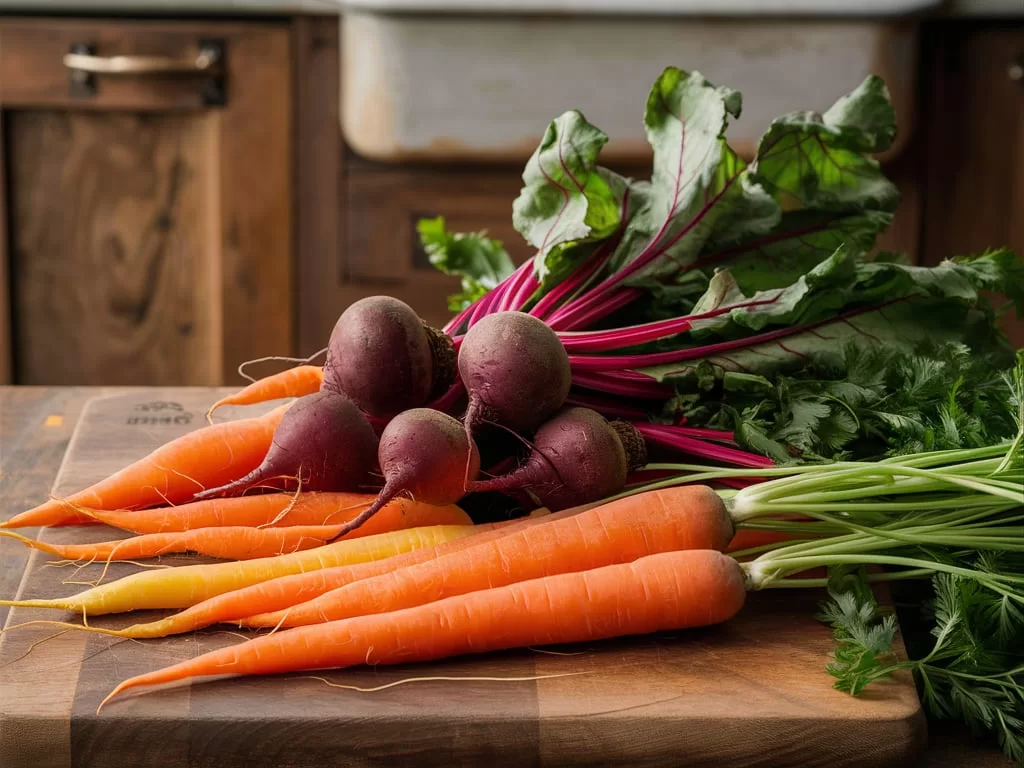
These colorful root vegetables are packed with nutrients, but they don’t make good storage companions.
Why They Shouldn’t Mix:
- Beets can transfer their strong color and earthy flavor to carrots
- Carrots may absorb excess moisture from beets, leading to faster spoilage
- Both vegetables compete for humidity in storage
Storage Solution:
Store carrots and beets separately in the refrigerator. Remove any green tops before storage, as they can draw moisture from the roots.
5. Cauliflower and Broccoli: Ethylene Sensitivity
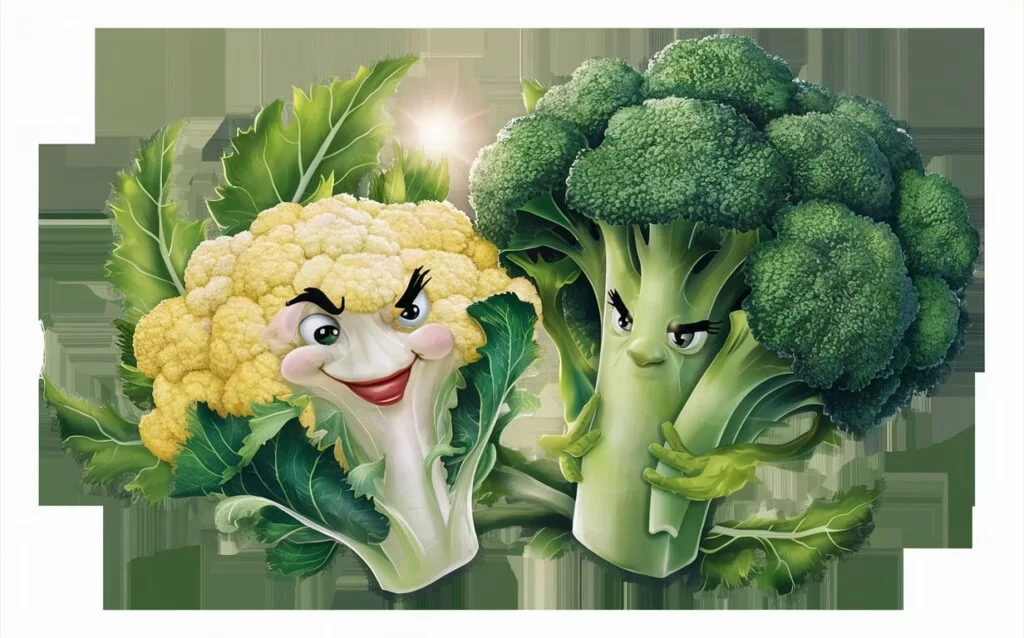
These cruciferous vegetables are beloved in Indian cuisine, from gobi paratha to broccoli sabzi. However, they have different storage needs.
Why They Shouldn’t Mix:
- Cauliflower is highly sensitive to ethylene
- Broccoli produces ethylene as it ages
- Storing them together can cause cauliflower to turn yellow and develop brown spots
Storage Solution:
Store cauliflower and broccoli separately in perforated plastic bags in the refrigerator. Use them within a few days for optimal freshness and nutrition.
6. Garlic and Ginger: Aromatic Interference
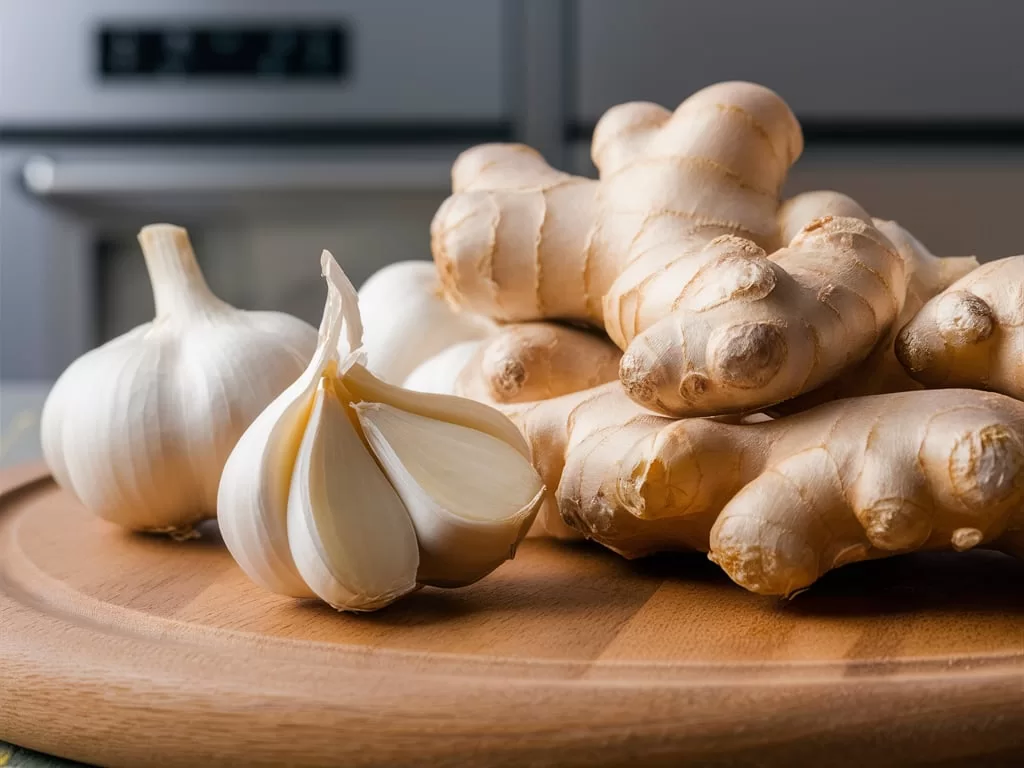
These aromatic roots are the foundation of many Indian dishes, but they should be stored separately.
Why They Shouldn’t Mix:
- Garlic can impart its strong flavor to ginger
- Ginger requires more humidity than garlic
- Storing them together can lead to mold growth on ginger
Storage Solution:
Store garlic in a cool, dry place with good air circulation. Keep ginger in the refrigerator, wrapped in a paper towel and placed in a plastic bag with a few holes for ventilation.
Conclusion: Mindful Storage for Maximum Nourishment
As we embrace the concept of food as medicine, it’s crucial to recognize that proper storage is an essential part of maintaining the healing properties of our vegetables. By keeping these six combinations separate, we not only extend the life of our produce but also preserve their nutritional integrity and flavor profiles.
In the Indian context, where our markets are often filled with an abundance of fresh, seasonal produce, implementing these storage practices can help reduce food waste and ensure that we’re getting the most out of every vegetable we bring into our homes. Remember, the journey from farm to table doesn’t end when we purchase our vegetables—it continues with how we care for them in our kitchens.
Key Takeaways:
- Understand the ethylene-producing and ethylene-sensitive nature of your vegetables.
- Store ethylene-producing vegetables separately from ethylene-sensitive ones.
- Pay attention to temperature and humidity requirements for different vegetables.
- Use proper storage containers and techniques to extend freshness
- Regularly check your stored vegetables and use them in order of perishability
By adopting these mindful storage practices, we honor the ancient wisdom of “Let food be thy medicine” and take an active role in our health and well-being. Let us approach our vegetable storage with the same care and intention that we bring to preparing our meals, knowing that every small action contributes to the nourishment of our bodies and the sustainability of our food practices.
As we move forward, let’s commit to being more conscious of how we store our vegetables. By doing so, we not only improve our own health but also contribute to a more sustainable and mindful approach to food consumption. After all, in the grand tapestry of health and nutrition, even the smallest threads—like proper vegetable storage—can make a significant difference in the overall picture of our well-being.
🔬 Reviewed for Scientific Accuracy by:
With over 15 years of academic and clinical experience, Dr. Gautam oversees the scientific and editorial integrity of educational content related to herbs, nutrition, and wellness.
ResearchGate Profile | ORCID
Dr. Khurana brings deep expertise in nutraceutical formulation, phytochemistry, and metabolic health. He reviews FarmPURE content to ensure alignment with evolving biochemical and plant-based research.
ORCID
All FarmPURE Blog content is reviewed by domain experts to ensure it reflects the highest standards of botanical integrity, scientific relevance, and practical guidance. Our mission is to promote better health and beauty through the power of organic herbs, spices, and plant-based wellness solutions.
Disclaimer: The information provided in this blog is intended for general wellness and educational purposes only. It is not a substitute for professional medical advice, diagnosis, or treatment. Dr. Rashmi Gautam and Dr. Nikhil Khurana participate as scientific reviewers only, and do not provide or endorse personalized medical recommendations. Always consult a qualified healthcare provider before making decisions related to your health.

